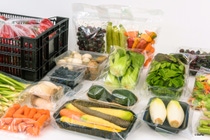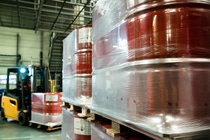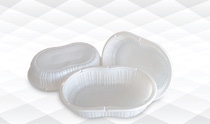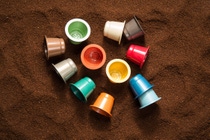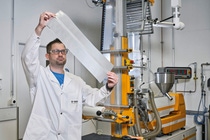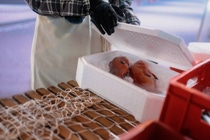Media
BASF at interpack 2023: Shaping the future of the packaging industry with sustainable solutions
- Trade fair for packaging from May 4 to 10, 2023 in Düsseldorf, Germany
- BASF continues “Plastics Journey” for a more sustainable plastics industry
- New projects and solutions for customers and partners on the three phases of the “MAKE-USE-RECYCLE” life cycle in the packaging sector
After the virtual event two years ago, the international trade fair for packaging interpack will be held again at Messe Düsseldorf from May 4 to 10, 2023. BASF will be represented together with BTC Europe, its European distribution organization, at Stand B43 in Hall 10 and will present numerous solutions and new projects in the packaging sector to customers and partners. The focus is on sustainability: Whether market-leading products or new technologies – on the way to a more sustainable plastics industry, BASF will continue its “Plastics Journey” with the three phases “MAKE-USE-RECYLE” in the life cycle of plastics at interpack.
Ultramid Ccycled as sustainable solution for packaging
One example is BASF’s sustainable polyamide Ultramid® Ccycled® – a future-oriented mass-balanced product that supports the use of alternative raw materials from the chemical recycling of plastic waste. Chemical recycling currently uses plastic waste that is difficult to recycle, such as end-of-life tyres or mixed household packaging, thus keeping it in the material cycle. The recycled raw material is fed into the beginning of the BASF production Verbund and allocated to Ultramid Ccycled products via a mass-balance approach. Fossil raw materials are thus replaced and saved. This solution is used in many segments, such as textiles and packaging. Since Ultramid Ccycled has the same quality as the conventional product, the sustainable polyamide is also ideally suited for highly regulated applications such as food packaging.
PE/PA multilayer films are recyclable
BASF has also done a lot with regard to polyethylene/polyamide multilayer films: Since fall 2022, coextruded PE/PA film structures have been considered mechanically recyclable. Based on the studies of Institute cyclos-HTP GmbH, the Stiftung Zentrale Stelle Verpackungsregister (Central Agency Packaging Register) has reclassified the recyclability of polyamides in the minimum standard. This is an important first step towards incorporating the benefits of polyamide-containing packaging and the latest findings on the recyclability of polyamides into the legal basis. As a major producer of Ultramid® extrusion polyamides for multilayer films, BASF is involved in projects for objective categorization of polyamides in flexible packaging applications.
Elastostat enables the use of PE blown film in potentially explosive areas
The film innovation DUO EX-TRA by film manufacturer DUO PLAST AG in Lauterbach is equipped with the static dissipative polymer Elastostat®. The result is the first stretch film suitable for use in potentially explosive atmospheres (EX zones). The newly developed film avoids the ignition source electrostatics. Thus stretched pallet units no longer pose an explosion hazard.
Conventional stretch films are not approved for hazardous areas due to static charge and pallets must be repacked before entering. The effort involved in unpacking and packing incoming and outgoing goods with conventional stretch film is enormous. Therefore, the stretch film with Elastostat is particularly suitable for companies in the chemical industry and their suppliers, who can be supplied directly to hazardous areas in the future. The packaging delivery process becomes more efficient, sustainability improves and costs are reduced at the same time.
For more information, see Elastollan.com
Ultradur Barrier B6560 M2 FC TF – a true monolayer with excellent barrier properties
The packaging market currently faces two major challenges: the trend towards mono-material solutions and recycling of packaging as simple and efficient as possible. The new Ultradur® Barrier B6560 M2 FC TF closes exactly this gap.
As a true monomaterial, the new Ultradur® grade offers great advantages in sorting and recycling. At the same time, the material is characterized by excellent barrier properties. The processability of the PBT is ideal for the extrusion of films and the thermoforming of packaging. Ultradur Barrier B6560 M2 FC TF thus meets precisely the requirements of modern, contemporary and sustainable packaging.
For more information, see Ultradurextrusion.basf.com
New Ultradur B1520 FC grades enable single layer capsules with high barrier and low THF migration
Ultradur® B1520 FC R01 is a high flowability PBT that was specially developed for injection-molded thin-walled packaging for cosmetics- and food products. One of the main applications are coffee capsules. The portfolio has now been enlarged by adding two specific grades with special properties: Ultradur® B1520 FC LM and Ultradur® Barrier B1520 FC LM. The former ensures a low THF migration (“LM” = low migration) and therefore the lowest flavor interaction between the capsule and the coffee inside. Ultradur Barrier B1520 FC LM also provides low migration but on top a further improved barrier function: After a whole year, the O2 concentration inside the capsule is only at a maximum of 0.1 %. This is accompanied by the advantage of secondary packaging becoming redundant. With the Ultrasim® design, BASF offers a calculation service which makes it possible to reduce the capsule weight without losing functionality. Moreover, BASF provides different solutions to make the material even more sustainable, as for example the biomass balance approach. By choosing this, the product saves fossil resources.
More about Ultradur for coffee capsules: Ultradur B1520 FC R01
Flexible packaging solutions with water-based Epotal adhesives
BASF’s water-based Epotal® lamination adhesives are a sustainable alternative to solvent-based and solvent-less products. They represent a reliable option for manufacturers of flexible packaging on all performance levels. Their high initial bond strength enables the immediate further processing of the laminates. Curing times are minimal, which leads to significantly shortened lead times. Due to their chemical composition, water-based adhesives are inherently safe systems.
The Epotal portfolio also tackles the end-of-life challenges for flexible packaging. One solution facilitates the recycling of multi-layer packaging materials by making the single layers of a packaging film easy to separate from each other within the recycling process. Another option is an adhesive that does not negatively affect the paper recycling process and perfectly fits to paper-based packaging materials. To achieve fully compostable packaging, Epotal adhesives can be combined with paper, BASF’s biopolymer ecovio or other compostable polymers. Furthermore, BASF offers barrier coatings or adhesives for mono-material packaging. Customers can test these water-based systems at BASF’s Adhesive Coating Center in Ludwigshafen.
Packaging innovations made of Styropor Ccycled
BASF continuously develops innovative solutions for the packaging industry such as Styropor® Ccycled®. In its production, recycled instead of fossil feedstocks are used at the beginning of the chemical value chain. The amount of circular raw material is assigned to the products using a certified mass balance approach. In cooperation with customers, Styropor® packaging solutions are created for which plastic waste has been recycled. This reduces the use of fossil resources. Styropor Ccycled has identical properties and the same high quality as conventional Styropor. Therefore, it is particularly suitable for use in temperature-sensitive applications in the pharmaceutical and food sectors. Styropor Ccycled is used, for example, to transport fish and frozen food or medical products such as vaccines. In addition, it serves as protective packaging for damageable goods such as electrical appliances.
Solutions for packaging inks and barrier coatings with water-based Joncryl resins
BASF’s comprehensive resins and additives portfolio meets even the most stringent formulation requirements of ink, ink-receptive coating and overprint varnish manufacturers. Our Joncryl® BRC products contain up to 64 % bio-based material and are supporting the next step in formulating toward a more sustainable packaging future. The Joncryl MB portfolio was developed as part of BASF’s biomass balance approach for water-based binders and helps to achieve significant savings in CO2 emissions, even down to a net zero product carbon footprint (PCF), without having to compromise on quality or performance. The Joncryl HPB and Joncryl HSL technologies provide formulators with water-based polymers approved for food contact that are used in coatings for functionalized paper and paper board packaging solutions. These water-based polymers not only offer the same level of water resistance and heat sealability properties as current extrusion coating layers but also limit penetration of grease, mineral oil, water(vapor) and oxygen.
BASF presents a newly developed certified home-compostable ecovio grade for extrusion coating on paper and board
BASF extends its ecovio® portfolio for extrusion coating on paper and board by adding a certified home and industrial compostable grade for cold and hot food packaging. The new extrusion coating grade ecovio® 70 PS14H6 is food-contact approved and shows excellent barrier properties against liquids, fats, grease, and mineral oil as well as temperature stability at boiling water. It is also characterized by outstanding adhesion to many types of paper and board and thus enables paper applications like ice-cream cups, yoghurt pots, coffee capsules and to-go cups for hot and cold drinks. After usage, food packaging made of ecovio 70 PS14H6 can be composted either in home compost or industrial composting facilities according to national legislation. The new home-compostable biopolymer thus supports organics recycling and helps close the nutrient loop to achieve a circular economy.
Meeting the challenges of circularity of plastic packaging with additives
At interpack 2023, BASF will showcase several additive solutions to improve the durability, transparency and circularity of plastic packaging, meeting the demands of brand owners, recyclers and converters.
The IrgaCycle® range of additives enhances circularity and can maximize the post-consumer recycled content in an end-use plastic packaging. In addition, they mitigate common processing challenges such as gel formation and defects when using recyclates while rejuvenating the stabilizing additive package that may have been depleted during the first lifecycle of a package. The IrgaCycle range is part of the VALERAS® portfolio, the brand name under which BASF markets its range of sustainable plastic additive solutions.
With its Irgastab® nucleating and Irgaclear® clarifying additive technologies, BASF is also demonstrating highly effective solutions for improving the mechanical properties and transparency of packaging materials while ensuring their recyclability due to their very efficient dosage. The low concentration helps to avoid additive accumulation over multiple cycle times, which could reduce recyclability.
SPOTLIGHT Talks & Trends: Circular Economy – Closing the Loop
BASF will give a keynote speech on “Advancing performance for circular packaging applications” on May 5 at the SPOTLIGHT area at the North Entrance of the fair. The focus of that day will be “Circular Economy – Closing the Loop” and BASF experts will highlight its solutions designed for sustainable packaging applications.
For more information on BASF at interpack, please visit our website www.basf.com/interpack2023.
About BASF
Chemistry for a sustainable future - that's what BASF stands for. We combine economic success with environmental protection and social responsibility. More than 111,000 employees in the BASF Group contribute to the success of our customers from almost all industries and in almost every country in the world. Our portfolio comprises six segments: Chemicals, Materials, Industrial Solutions, Surface Technologies, Nutrition & Care and Agricultural Solutions. BASF achieved global sales of €87.3 billion in 2022. BASF shares are traded on the Frankfurt Stock Exchange (BAS) and as American Depositary Receipts (BASFY) in the United States. For more information, visit www.basf.com.
About BTC
BTC Europe belongs to the world's leading chemical group, BASF – We create chemistry.
BTC Europe GmbH is BASF’s European sales organization for specialty chemicals. Our strengths lie in our knowledge of the industry, based on many years of experience, and our proximity to our customers. With its 11 regional offices and more than 500 employees in Europe, BTC Europe supplies small and medium-sized customers from a wide variety of industries with about 6,000 products. BTC Europe is headquartered in Monheim am Rhein.
Further information on BTC is available on the Internet at www.btc-europe.com
P-23-183

